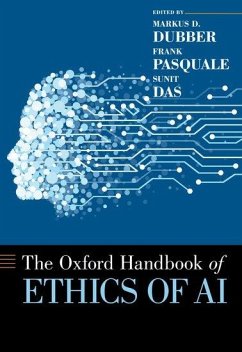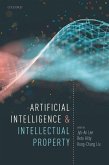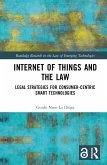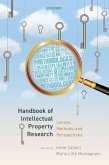Markus Dubber (Professor of Law & Criminology and Director of the C, Frank Pasquale (Piper & Piper Marbury Professor of Law & Marbury P, Sunit Das (Associ Associate Professor in the Department of Surgery
Oxford Handbook of Ethics of AI
Markus Dubber (Professor of Law & Criminology and Director of the C, Frank Pasquale (Piper & Piper Marbury Professor of Law & Marbury P, Sunit Das (Associ Associate Professor in the Department of Surgery
Oxford Handbook of Ethics of AI
- Broschiertes Buch
- Merkliste
- Auf die Merkliste
- Bewerten Bewerten
- Teilen
- Produkt teilen
- Produkterinnerung
- Produkterinnerung
This Handbook provides an international, interdisciplinary, analysis and review of the way that artificial intelligence is introduced, defined, applied, and exploited, and governed in all spheres of individual, commercial, social, and public life.
Andere Kunden interessierten sich auch für
![Artificial Intelligence and Intellectual Property Artificial Intelligence and Intellectual Property]() Reto HiltyArtificial Intelligence and Intellectual Property173,99 €
Reto HiltyArtificial Intelligence and Intellectual Property173,99 €![Internet of Things and the Law Internet of Things and the Law]() Guido Noto La DiegaInternet of Things and the Law137,99 €
Guido Noto La DiegaInternet of Things and the Law137,99 €![Internet of Things and the Law Internet of Things and the Law]() Guido Noto La DiegaInternet of Things and the Law44,99 €
Guido Noto La DiegaInternet of Things and the Law44,99 €![Oxford Handbook of Intellectual Property Law Oxford Handbook of Intellectual Property Law]() Rochelle C DreyfussOxford Handbook of Intellectual Property Law285,99 €
Rochelle C DreyfussOxford Handbook of Intellectual Property Law285,99 €![International Copyright 4th Edition International Copyright 4th Edition]() Paul Goldstein (Of Counsel, Of Counsel, Morrison & Foerster)International Copyright 4th Edition55,99 €
Paul Goldstein (Of Counsel, Of Counsel, Morrison & Foerster)International Copyright 4th Edition55,99 €![Photography and the Law Photography and the Law]() Michael O'FlanaganPhotography and the Law44,99 €
Michael O'FlanaganPhotography and the Law44,99 €![Handbook of Intellectual Property Research Handbook of Intellectual Property Research]() Handbook of Intellectual Property Research157,99 €
Handbook of Intellectual Property Research157,99 €-
-
This Handbook provides an international, interdisciplinary, analysis and review of the way that artificial intelligence is introduced, defined, applied, and exploited, and governed in all spheres of individual, commercial, social, and public life.
Hinweis: Dieser Artikel kann nur an eine deutsche Lieferadresse ausgeliefert werden.
Hinweis: Dieser Artikel kann nur an eine deutsche Lieferadresse ausgeliefert werden.
Produktdetails
- Produktdetails
- Verlag: Oxford University Press Inc
- Seitenzahl: 896
- Erscheinungstermin: 30. April 2021
- Englisch
- Abmessung: 249mm x 176mm x 62mm
- Gewicht: 1456g
- ISBN-13: 9780197601440
- ISBN-10: 0197601448
- Artikelnr.: 62114091
- Herstellerkennzeichnung
- Libri GmbH
- Europaallee 1
- 36244 Bad Hersfeld
- gpsr@libri.de
- Verlag: Oxford University Press Inc
- Seitenzahl: 896
- Erscheinungstermin: 30. April 2021
- Englisch
- Abmessung: 249mm x 176mm x 62mm
- Gewicht: 1456g
- ISBN-13: 9780197601440
- ISBN-10: 0197601448
- Artikelnr.: 62114091
- Herstellerkennzeichnung
- Libri GmbH
- Europaallee 1
- 36244 Bad Hersfeld
- gpsr@libri.de
Markus Dubber leads an interdisciplinary initiative, "Ethics of AI in Context," as director of the University of Toronto's Centre for Ethics, which facilitates collaboration among a diverse group of university and non-university scholars and researchers from a wide range of backgrounds and perspectives. He also has extensive editorial experience, including as co-editor of several Oxford Handbooks and editor-in-chief of Oxford Handbooks Online (Law). Frank Pasquale (School of Law, University of Maryland) has published extensively on the law, policy, and ethics of artificial intelligence and cognate fields (including algorithmic accountability, machine learning, and big data). He has served on the Council on Big Data, Ethics, and Society, the Academic Council of the AINow Institute, and the National Committee on Vital and Health Statistics. His 2015 book The Black Box Society developed a social theory of reputation, search, and finance, while proposing pragmatic reforms to improve the information economy. Sunit Das (University of Toronto, Medicine) has conducted research on the role of AI in medicine as a neurosurgeon at Toronto's St. Michael's Hospital, a neuroscientist in the Keenan Research Centre for Biomedical Science, and faculty affiliate of the Ethics of AI Lab at the Centre for Ethics, University of Toronto.
* Part I. Introduction and Overview
* 1. The Artificial Intelligence of Ethics of AI: An Introductory
Overview
* Joanna Bryson
* 2. The Ethics of Ethics of AI: Mapping the Field
* Thomas Powers, Delaware and Jean-Gabriel Ganascia
* 3. Ethics of AI in Context: Society and Culture
* Judith Donath
* Part II. Frameworks and Modes
* 4. Why Industry Self-regulation Will Not Deliver 'Ethical AI': A Call
for Legally Mandated Techniques of 'Human Rights by Design'
* Karen Yeung, Andrew Howes and Ganna Pogrebna
* 5. Private Sector AI: Ethics and Incentives
* Tom Slee
* 6. Normative Modes: Codes and Standards
* Paula Boddington
* 7. Normative Modes: Professional Ethics
* Urs Gasser
* Part III. Concepts and Issues
* 8. Fairness and the Concept of 'Bias'
* Safiya Umoja Noble
* 9. Accountability in Computer Systems
* Joshua Kroll
* 10. Transparency
* Nick Diakopoulos
* 11. Responsibility
* Virginia Dignum
* 12. The Concept of Handoff as a Model for Ethical Analysis and Design
* Helen Nissenbaum and Deirdre Mulligan
* 13. Race and Gender
* Timnit Gebru
* 14. The Future of Work in the Age of AI: Displacement, Augmentation,
or Control?
* Karen Levy and Pegah Moradi
* 15. The Rights of Artificial Intelligences
* John Basl and Joseph Bowen
* 16. The Singularity: Sobering up About Merging with AI
* Susan Schneider
* 17. Do Sentient AIs Have Rights? If So, What Kind?
* Mark Kingwell
* 18. Autonomy
* Michael Wheeler
* 19. Troubleshooting AI and Consent
* Meg Leta Jones
* 20. Is Human Judgment Necessary?
* Norman Spaulding
* 21. Sexuality
* John Danaher
* IV. Perspectives and Approaches
* 22. Computer Science
* Benjamin Kuipers
* 23. Engineering
* Jason Millar
* 24. Designing Robots Ethically Without Designing Ethical Robots: A
Perspective from Cognitive Science
* Ron Chrisley
* 25. Economics
* Anton Korinek
* 26. Statistics
* Martin Wells
* 27. Automating Origination: Perspectives from the Humanities
* Avery Slater
* 28. Philosophy
* David Gunkel
* 29. The Complexity of Otherness: Anthropological contributions to
robots and AI
* Kathleen Richardson
* 30. Calculative Composition: The Ethics of Automating Design
* Shannon Mattern
* 31. Global South
* Chinmayi Arun
* 32. East Asia
* Danit Gal
* 33. Artificial Intelligence and Inequality in the Middle East: The
Political Economy of Inclusion
* Nagla Rizk
* 34. Europe's struggle to set global AI standards
* Andrea Renda
* Part V. Cases and Applications
* 35. The Ethics of Artificial Intelligence in Transportation
* Bryant Walker Smith
* 36. Military
* Jai Galliott
* 37. The Ethics of AI in Biomedical Research, Medicine and Public
Health
* Effy Vayena and Alessandro Blasimme
* 38. Law: Basic Questions
* Harry Surden
* 39. Law: Criminal Law
* Chelsea Barabas
* 40. Law: Public Law and Policy: Notice, Predictability, and Due
Process
* Kiel Brennan-Marquez
* 41. Law: Immigration and Refugee Law
* Petra Molnar
* 42. Education
* Elana Zeide
* 43. Algorithms and the Social Organization of Work
* Ifeoma Ajunwa
* 44. Smart City Ethics Goodman
* 1. The Artificial Intelligence of Ethics of AI: An Introductory
Overview
* Joanna Bryson
* 2. The Ethics of Ethics of AI: Mapping the Field
* Thomas Powers, Delaware and Jean-Gabriel Ganascia
* 3. Ethics of AI in Context: Society and Culture
* Judith Donath
* Part II. Frameworks and Modes
* 4. Why Industry Self-regulation Will Not Deliver 'Ethical AI': A Call
for Legally Mandated Techniques of 'Human Rights by Design'
* Karen Yeung, Andrew Howes and Ganna Pogrebna
* 5. Private Sector AI: Ethics and Incentives
* Tom Slee
* 6. Normative Modes: Codes and Standards
* Paula Boddington
* 7. Normative Modes: Professional Ethics
* Urs Gasser
* Part III. Concepts and Issues
* 8. Fairness and the Concept of 'Bias'
* Safiya Umoja Noble
* 9. Accountability in Computer Systems
* Joshua Kroll
* 10. Transparency
* Nick Diakopoulos
* 11. Responsibility
* Virginia Dignum
* 12. The Concept of Handoff as a Model for Ethical Analysis and Design
* Helen Nissenbaum and Deirdre Mulligan
* 13. Race and Gender
* Timnit Gebru
* 14. The Future of Work in the Age of AI: Displacement, Augmentation,
or Control?
* Karen Levy and Pegah Moradi
* 15. The Rights of Artificial Intelligences
* John Basl and Joseph Bowen
* 16. The Singularity: Sobering up About Merging with AI
* Susan Schneider
* 17. Do Sentient AIs Have Rights? If So, What Kind?
* Mark Kingwell
* 18. Autonomy
* Michael Wheeler
* 19. Troubleshooting AI and Consent
* Meg Leta Jones
* 20. Is Human Judgment Necessary?
* Norman Spaulding
* 21. Sexuality
* John Danaher
* IV. Perspectives and Approaches
* 22. Computer Science
* Benjamin Kuipers
* 23. Engineering
* Jason Millar
* 24. Designing Robots Ethically Without Designing Ethical Robots: A
Perspective from Cognitive Science
* Ron Chrisley
* 25. Economics
* Anton Korinek
* 26. Statistics
* Martin Wells
* 27. Automating Origination: Perspectives from the Humanities
* Avery Slater
* 28. Philosophy
* David Gunkel
* 29. The Complexity of Otherness: Anthropological contributions to
robots and AI
* Kathleen Richardson
* 30. Calculative Composition: The Ethics of Automating Design
* Shannon Mattern
* 31. Global South
* Chinmayi Arun
* 32. East Asia
* Danit Gal
* 33. Artificial Intelligence and Inequality in the Middle East: The
Political Economy of Inclusion
* Nagla Rizk
* 34. Europe's struggle to set global AI standards
* Andrea Renda
* Part V. Cases and Applications
* 35. The Ethics of Artificial Intelligence in Transportation
* Bryant Walker Smith
* 36. Military
* Jai Galliott
* 37. The Ethics of AI in Biomedical Research, Medicine and Public
Health
* Effy Vayena and Alessandro Blasimme
* 38. Law: Basic Questions
* Harry Surden
* 39. Law: Criminal Law
* Chelsea Barabas
* 40. Law: Public Law and Policy: Notice, Predictability, and Due
Process
* Kiel Brennan-Marquez
* 41. Law: Immigration and Refugee Law
* Petra Molnar
* 42. Education
* Elana Zeide
* 43. Algorithms and the Social Organization of Work
* Ifeoma Ajunwa
* 44. Smart City Ethics Goodman
* Part I. Introduction and Overview
* 1. The Artificial Intelligence of Ethics of AI: An Introductory
Overview
* Joanna Bryson
* 2. The Ethics of Ethics of AI: Mapping the Field
* Thomas Powers, Delaware and Jean-Gabriel Ganascia
* 3. Ethics of AI in Context: Society and Culture
* Judith Donath
* Part II. Frameworks and Modes
* 4. Why Industry Self-regulation Will Not Deliver 'Ethical AI': A Call
for Legally Mandated Techniques of 'Human Rights by Design'
* Karen Yeung, Andrew Howes and Ganna Pogrebna
* 5. Private Sector AI: Ethics and Incentives
* Tom Slee
* 6. Normative Modes: Codes and Standards
* Paula Boddington
* 7. Normative Modes: Professional Ethics
* Urs Gasser
* Part III. Concepts and Issues
* 8. Fairness and the Concept of 'Bias'
* Safiya Umoja Noble
* 9. Accountability in Computer Systems
* Joshua Kroll
* 10. Transparency
* Nick Diakopoulos
* 11. Responsibility
* Virginia Dignum
* 12. The Concept of Handoff as a Model for Ethical Analysis and Design
* Helen Nissenbaum and Deirdre Mulligan
* 13. Race and Gender
* Timnit Gebru
* 14. The Future of Work in the Age of AI: Displacement, Augmentation,
or Control?
* Karen Levy and Pegah Moradi
* 15. The Rights of Artificial Intelligences
* John Basl and Joseph Bowen
* 16. The Singularity: Sobering up About Merging with AI
* Susan Schneider
* 17. Do Sentient AIs Have Rights? If So, What Kind?
* Mark Kingwell
* 18. Autonomy
* Michael Wheeler
* 19. Troubleshooting AI and Consent
* Meg Leta Jones
* 20. Is Human Judgment Necessary?
* Norman Spaulding
* 21. Sexuality
* John Danaher
* IV. Perspectives and Approaches
* 22. Computer Science
* Benjamin Kuipers
* 23. Engineering
* Jason Millar
* 24. Designing Robots Ethically Without Designing Ethical Robots: A
Perspective from Cognitive Science
* Ron Chrisley
* 25. Economics
* Anton Korinek
* 26. Statistics
* Martin Wells
* 27. Automating Origination: Perspectives from the Humanities
* Avery Slater
* 28. Philosophy
* David Gunkel
* 29. The Complexity of Otherness: Anthropological contributions to
robots and AI
* Kathleen Richardson
* 30. Calculative Composition: The Ethics of Automating Design
* Shannon Mattern
* 31. Global South
* Chinmayi Arun
* 32. East Asia
* Danit Gal
* 33. Artificial Intelligence and Inequality in the Middle East: The
Political Economy of Inclusion
* Nagla Rizk
* 34. Europe's struggle to set global AI standards
* Andrea Renda
* Part V. Cases and Applications
* 35. The Ethics of Artificial Intelligence in Transportation
* Bryant Walker Smith
* 36. Military
* Jai Galliott
* 37. The Ethics of AI in Biomedical Research, Medicine and Public
Health
* Effy Vayena and Alessandro Blasimme
* 38. Law: Basic Questions
* Harry Surden
* 39. Law: Criminal Law
* Chelsea Barabas
* 40. Law: Public Law and Policy: Notice, Predictability, and Due
Process
* Kiel Brennan-Marquez
* 41. Law: Immigration and Refugee Law
* Petra Molnar
* 42. Education
* Elana Zeide
* 43. Algorithms and the Social Organization of Work
* Ifeoma Ajunwa
* 44. Smart City Ethics Goodman
* 1. The Artificial Intelligence of Ethics of AI: An Introductory
Overview
* Joanna Bryson
* 2. The Ethics of Ethics of AI: Mapping the Field
* Thomas Powers, Delaware and Jean-Gabriel Ganascia
* 3. Ethics of AI in Context: Society and Culture
* Judith Donath
* Part II. Frameworks and Modes
* 4. Why Industry Self-regulation Will Not Deliver 'Ethical AI': A Call
for Legally Mandated Techniques of 'Human Rights by Design'
* Karen Yeung, Andrew Howes and Ganna Pogrebna
* 5. Private Sector AI: Ethics and Incentives
* Tom Slee
* 6. Normative Modes: Codes and Standards
* Paula Boddington
* 7. Normative Modes: Professional Ethics
* Urs Gasser
* Part III. Concepts and Issues
* 8. Fairness and the Concept of 'Bias'
* Safiya Umoja Noble
* 9. Accountability in Computer Systems
* Joshua Kroll
* 10. Transparency
* Nick Diakopoulos
* 11. Responsibility
* Virginia Dignum
* 12. The Concept of Handoff as a Model for Ethical Analysis and Design
* Helen Nissenbaum and Deirdre Mulligan
* 13. Race and Gender
* Timnit Gebru
* 14. The Future of Work in the Age of AI: Displacement, Augmentation,
or Control?
* Karen Levy and Pegah Moradi
* 15. The Rights of Artificial Intelligences
* John Basl and Joseph Bowen
* 16. The Singularity: Sobering up About Merging with AI
* Susan Schneider
* 17. Do Sentient AIs Have Rights? If So, What Kind?
* Mark Kingwell
* 18. Autonomy
* Michael Wheeler
* 19. Troubleshooting AI and Consent
* Meg Leta Jones
* 20. Is Human Judgment Necessary?
* Norman Spaulding
* 21. Sexuality
* John Danaher
* IV. Perspectives and Approaches
* 22. Computer Science
* Benjamin Kuipers
* 23. Engineering
* Jason Millar
* 24. Designing Robots Ethically Without Designing Ethical Robots: A
Perspective from Cognitive Science
* Ron Chrisley
* 25. Economics
* Anton Korinek
* 26. Statistics
* Martin Wells
* 27. Automating Origination: Perspectives from the Humanities
* Avery Slater
* 28. Philosophy
* David Gunkel
* 29. The Complexity of Otherness: Anthropological contributions to
robots and AI
* Kathleen Richardson
* 30. Calculative Composition: The Ethics of Automating Design
* Shannon Mattern
* 31. Global South
* Chinmayi Arun
* 32. East Asia
* Danit Gal
* 33. Artificial Intelligence and Inequality in the Middle East: The
Political Economy of Inclusion
* Nagla Rizk
* 34. Europe's struggle to set global AI standards
* Andrea Renda
* Part V. Cases and Applications
* 35. The Ethics of Artificial Intelligence in Transportation
* Bryant Walker Smith
* 36. Military
* Jai Galliott
* 37. The Ethics of AI in Biomedical Research, Medicine and Public
Health
* Effy Vayena and Alessandro Blasimme
* 38. Law: Basic Questions
* Harry Surden
* 39. Law: Criminal Law
* Chelsea Barabas
* 40. Law: Public Law and Policy: Notice, Predictability, and Due
Process
* Kiel Brennan-Marquez
* 41. Law: Immigration and Refugee Law
* Petra Molnar
* 42. Education
* Elana Zeide
* 43. Algorithms and the Social Organization of Work
* Ifeoma Ajunwa
* 44. Smart City Ethics Goodman








